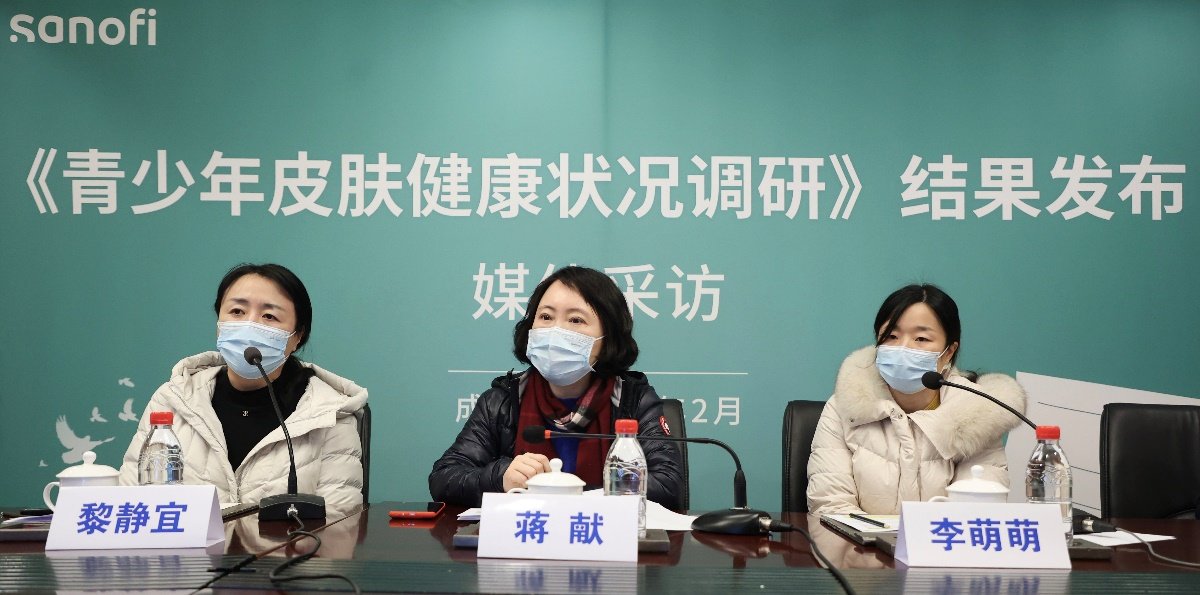
Chuanguan News reporter Shi Xiaohong
Spring is the season of high incidence of skin problems, and teenagers in the “flowering age” will also appear more frequently in spring “Appearance Anxiety”. Recently, Health Daily and Sanofi jointly released the “Adolescent Skin Health Status Survey”, which investigated the awareness and prevalence of skin-related diseases among 1096 adolescents aged 12-17 in Chengdu.
Nearly half of teenagers suffer from skin diseases, and few people know about atopic dermatitis
The results of Chengdu’s “Adolescent Skin Health Survey” show that more than 64% of teenagers have skin problems in spring. The most common skin symptoms in adolescents were dry skin, peeling (23.3%), skin allergies during seasonal changes (14.9%), and itching (10.8%). “Although the air humidity in Chengdu is more comfortable than that in the north, from the perspective of outpatient visits, in the spring, the number of cases of skin problems in Chengdu still increased slightly, which is related to factors such as climate and environmental allergens. ,” said Jiang Xian, director of the Department of Dermatology at West China Hospital of Sichuan University.
In addition, about 48% of adolescents in Chengdu had suffered from skin-related diseases, but only 29% of the respondents said they had “heard of” the common atopic dermatitis. Li Jingyi, deputy director of the Department of Dermatology, West China Hospital of Sichuan University, said that compared with adults, atopic dermatitis is more common in adolescents, but people rarely “heard” of the disease, which shows the awareness of the disease It needs to be further improved, and it is also possible that when people experience itching, rash, etc., they will feel that it is “eczema”, and no further examination and diagnosis will be done. It is recommended that when you experience itching, dryness, rash, etc., go to the dermatology department of a regular hospital for treatment. A professional doctor will give a diagnosis and treatment plan after detailed inquiries about the medical history, family genetic history, and diagnostic examinations.
The child’s illness “bundles” the parents, and manages it as soon as possible to “reduce the burden” in the future
“Atopic dermatitis is the first disease of the allergic process of ‘skin-digestive tract-respiratory tract’. If If not treated in time, the disease may progress to more comorbidities of type 2 inflammation, such as food allergy, allergic rhinitis, and chronic sinusitis with nasal polyps. In the future, the difficulty of treatment will increase, the cost of treatment will also increase, and management will be more difficult. It’s complicated.” Li Mengmeng, a dermatologist at West China Hospital, Sichuan University reminded: “When adolescents are diagnosed with atopic dermatitis, long-term disease management should be carried out in a timely manner to reduce the risk of comorbidities and symptom progression.”
At the same time, Skin problems also bring trouble to the normal life, study and social interaction of adolescent patients. Surveys show that about 56% of adolescent atopic dermatitis patients are unable to sleep due to itching, about 38% delay learning due to recurrent disease, and about 32% are socially affected by skin lesions. After the child is sick, the parents will also be “bound”. About 59% of the families diagnosed with atopic dermatitis suffer from repeated visits to the doctor, which affects the parents’ work and life, and about 56% of the parents lack sleep because the children need to be with them. Jiang Xian said, “Atopic dermatitis will affect children’s psychology, physiology, study, employment and marriage. Early management, early intervention, and early whole-process supervision should be carried out to reduce the risk of more comorbidities in the future, which requires clinicians to Pay close attention to and attach importance to the early diagnosis and early treatment of skin-related diseases with family members, actively seek long-term effective and safe treatment methods, carry out long-term and standardized disease management, and take precautionary measures to ‘reduce the burden’ in the future.”
Effective and safe treatment is The key to long-term management
In long-term treatment, parents and adolescents are more concerned about the safety and side effects of treatment. The survey shows that about 68% of adolescent atopic dermatitis patients give priority to safe and less side effects when seeking treatment. In addition, long-term control does not recur (50%), does not affect growth and development (38.2%), and quickly relieves symptoms (35.3%). ), which is also a factor that patients and parents attach importance to.
Li Mengmeng said that adolescents are at a critical stage of physical growth and development, and more safe, effective, long-term and standardized treatment programs are urgently needed. In recent years, the timeliness, safety, convenience and accessibility of drugs have all improved. The emergence and application of innovative biological agents can take into account both effectiveness and safety. It is very useful for long-term control of the disease, improvement of juvenile atopic dermatitis patients. Quality of life is of great significance, such as targeted biological agents, which can act on specific inflammatory factors, effectively inhibit type 2 inflammatory response without interfering with other immune cells and molecules, and accurately target type 2 inflammation-related diseases. Research and real-world studies have confirmed that it is a safe, effective and long-term targeted therapy.
“The control effect of skin-related diseases in adolescents mostly depends on the concept and supervision of parents. We expect more parents and the public to know about common skin diseases, realize early diagnosis, standardize medical treatment, and choose long-term safe and effective drugs. Treatment plan, to achieve good management of the disease, healthy growth, study, life, work and give back to the society.” Li Jingyi said.